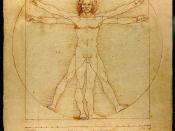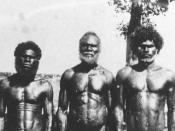Man Bites Man: On the Goodness and Shortcomings of Anthropos
The question of whether humanity itself is evil or not is one of the most fundamental
aspects to any cultural world view, and at best a very divisive one. The two major
representatives of this conflict within Christianity and in recent Western culture as a whole
were Pelagius and Augustine. The former of these two thinkers advocated a world-view
featuring man as capable of manufacturing for himself salvation; that humans could perfect
one another. Augustine asserted that man was at his core delectant in evil pursuits, and
therefore must look to higher creative powers for his control and redemption. Eventually
these two views were seemingly synthesized further by Rousseau into the ideal of the
noble savage, a man pre-civilized who was untouched by society and therefore good. His
view has survived in many ways to continue in popular Western thought that man is good
at conception but evil by his society's mold.
However man's decay by his society is not the
case, but it is man's lot rather that he is self-serving and immoral because he fails to follow
his own values like a three-year-old pretending to play chess. Man throughout recorded
history has been able to find faults with his enemies, often practicing these same vices
simultaneously yet writing these own vices off in himself as necessary and his enemies' as
inexcusable. Likewise the argument that man in a hunter-gatherer society is in fact noble
and disinclined toward destruction is also ludicrous. The 'uncivilized' human is not a
perfect individual in a society befitting his or her pristine senses - a truly perfect organism
is impermeable to decay - but a destructive being held in check by natural necessity.
Finally man has chosen to allow himself all but...


